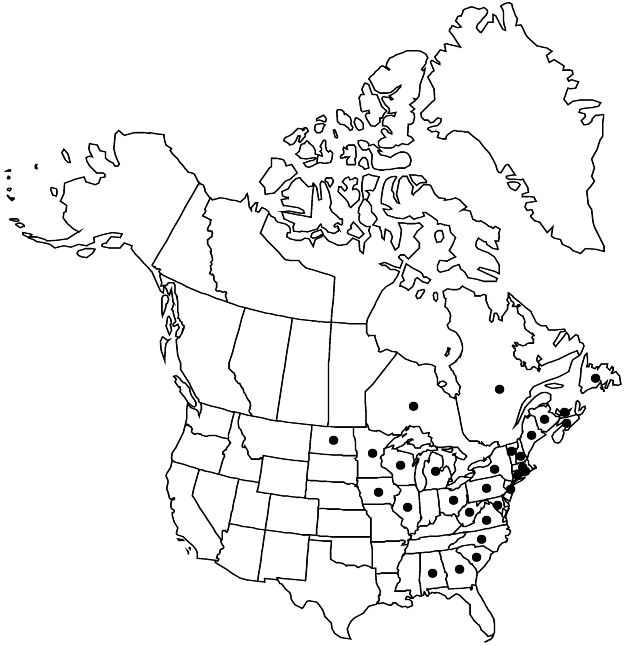Amelanchier spicata
Dendrologie 1: 182. 1869.
Shrubs, 0.3–1.2(–2) m. Stems 1–100, rhizomatous and in scattered colonies. Leaves half-unfolded; petiole (9.5–)11.5–16(–19) mm; blade oval to orbiculate, (22–)34–45(–61) × (13–)21–33(–52) mm, base subcordate or rounded, each margin (0–)3–9(–14) teeth on proximal 1/2 and (3 or)4–7(–11) teeth in distalmost cm, largest teeth less than 1 mm, apex acute to obtuse and sometimes mucronate, abaxial surface densely (moderately) hairy by flowering, surfaces glabrous or sparsely hairy later. Inflorescences (5 or)6–9(–14)-flowered, (11–)22–37(–52) mm. Pedicels: (0 or)1 subtended by a leaf, proximalmost 7–16(–22) mm. Flowers: sepals recurved after flowering, (1.7–)2–3(–4.4) mm; petals linear-oblong, (5.5–)6.5–9(–11) × (2–)2.7–4.4(–6.5) mm; stamens (10–)20; styles (4 or)5, (2.2–)3–3.8(–4.6) mm; ovary apex densely hairy (or glabrous). Pomes purple-black, 7–12 mm diam. 2n = 3x, 4x.
Phenology: Flowering Apr–Jun; fruiting Jul–Aug.
Habitat: Summits and cliffs of low mountains, open woods, woodland clearings, rocky soil, crevices, shores, fields, roadsides, peaty, sandy, or gravelly and, typically, acidic soil
Elevation: 0–1200 m
Distribution

N.B., Nfld. and Labr. (Nfld.), N.S., Ont., P.E.I., Que., Ala., Conn., Ga., Ill., Iowa, Maine, Md., Mass., Mich., Minn., N.H., N.J., N.Y., N.C., N.Dak., Ohio, Pa., R.I., S.C., Vt., Va., W.Va., Wis.
Discussion
Amelanchier spicata is strongly rhizomatous and has finely toothed leaves and a glabrous or densely hairy ovary apex. The species is similar to A. humilis in habit and vestiture of the ovary apices; it differs in leaf teeth, style length, style fusion, and fruit diameter. Amelanchier spicata prefers acidic soil; A. humilis is a calciphile. How A. spicata and A. nantucketensis differ is discussed under the latter.
Amelanchier oblongifolia var. micropetala B. L. Robinson was transferred to A. stolonifera as forma micropetala (B. L. Robinson) Rehder. The type of this name has petals that fall within the size range of those of A. nantucketensis, and the authors consider it a synonym of the latter.
P. M. Catling (2006) analyzed the morphology, including flowers, of Amelanchier lucida and concluded that it is distinct from A. spicata because of its shiny leaves and erect orientation of the sepals at flowering. Amelanchier lucida closely resembles A. spicata in overall habit, leaves, inflorescences, and fruits, and the authors have observed somewhat lustrous leaves in A. spicata. The authors, therefore, include A. lucida in A. spicata.
Informally recognized, Amelanchier "maritima" is a well-studied microspecies restricted to the Atlantic Coast from Massachusetts to mid Maine. This microspecies resembles A. spicata in habit and mature leaf characters and differs significantly with longer inflorescences, more flowers per inflorescences, and longer and wider petals.
M. L. Fernald (1950) and L. Cinq-Mars (1971) reported hybrids between Amelanchier spicata and A. arborea, A. bartramiana, A. intermedia, A. laevis, and A. sanguinea. Plants determined to be apomictic and attributed to this species by C. S. Campbell et al. (1987) were actually A. nantucketensis.
Selected References
None.